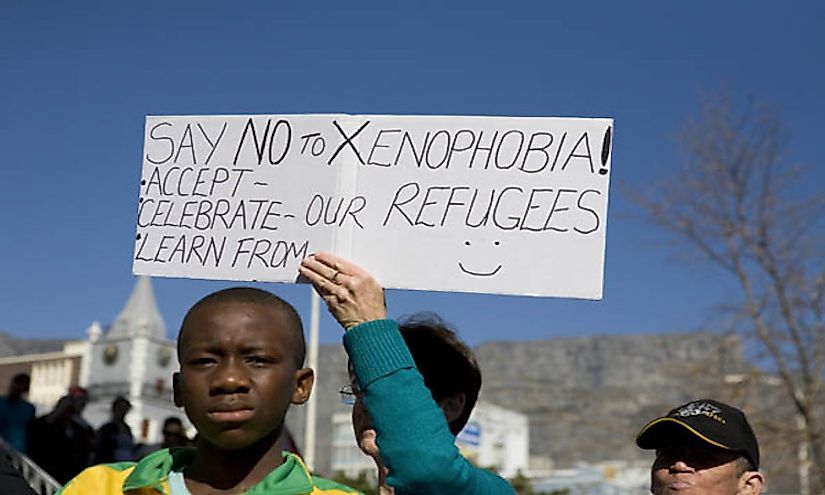Xenophobia In South Africa

Xenophobia In South Africa
South Africa has had several incidents of xenophobic attacks during the last two decades. Though not supported by data, these attacks are thought to have substantially grown in frequency after the democratic government came to power in 1994 after the end of the Apartheid era. The South African Migration Project (SAMP) noted in a study undertaken in 2004 that this aggression and intolerance towards foreigners was an unplanned consequence of the ANC government’s aggressive campaign to overcome the divisions left by apartheid and to build the nation. Cases of immigrants being discriminated and attacked had occurred in the pre-1994 South Africa and had at that time been a by-product of the apartheid system which had institutionalized racism in the country.
Leading causes Of Xenophobia In South Africa
The Human Sciences Research Council prepared a report in which they identified four reasons for this hostility towards foreigners. The leading causes of hostility to outsiders are relative deprivation, which causes fear that foreigners will take away the limited jobs and housing. The second reason includes social dynamics, along with psychological categorization, which is strongly influenced by a nationalist spirit and the third is the tendency to feel superior to other Africans, and the fourth is the idea of exclusive citizenship, a nationalistic attitude that excludes others/outsiders.
Additional Causes Of Xenophobia In South Africa
In addition to these four, other suggested causes include poor service delivery, high influx of foreigners, and local township politics. Due to the high rate of unemployment, some unemployed young people have turned to community leadership. Encouraging hostility towards immigrants, and organizing such attacks, is a way for these leaders to stamp their authority, and gain followers. Attacks also happen during the periods of fierce competition between gangs or groups, or in times when the community is emerging from a political vacuum.
Targets of Xenophobia
The primary targets of xenophobic violence and hostility are immigrants from other African countries. In 1977, civil war broke out in Mozambique, and in 1984 refugees began to turn up in South Africa. They were not granted refugee status, but the apartheid government gave them the permission to settle in the black homelands it had created for native Africans. Lebowa homeland was hostile to the Mozambicans and banned them from settling within its lands. Because of civil war in Congo, scores of Congolese escaped to South Africa, especially in 1993 and 1997. According to studies, there have been xenophobic attitudes in the country towards the refugees, for instance denying them access to basic health care. In addition to foreign Africans, attacks are also directed at immigrants from Asian countries like Pakistan and Bangladesh.
Statistics and Events Related To Xenophobia In South Africa
The death toll caused by xenophobic attacks from the year 2000 to 2008 was at least 67 people. The 20008 attacks resulted in the deaths of 62 people, with 21 of them being South African citizens. When a new round of attacks erupted in 2015, Malawi’s government began repatriation of its citizens.
Anti-Xenophobia Activism
There are measures to counteract the anti-foreigner spirit that swept through the country, and there are several anti-xenophobic movements that have cropped up in South Africa. These include the Western Cape Anti-Eviction Campaign. In shack settlements like Khutsong which is in Gauteng, KwaZulu-Natal, social movements have emerged, with the intention of ensuring there are no more violent attacks against immigrants.
Reactions To Xenophobic Attacks In South Africa
The government of South Africa has repeatedly condemned the attacks, even as political parties in the country lay the blame on each other. The attacks are widely thought to be caused by political incitement. Organisations and governments from Africa and the rest of the world have all condemned the attacks, with Malawi beginning the process of repatriating its nationals in 2015 after the attacks that took place in that year.











